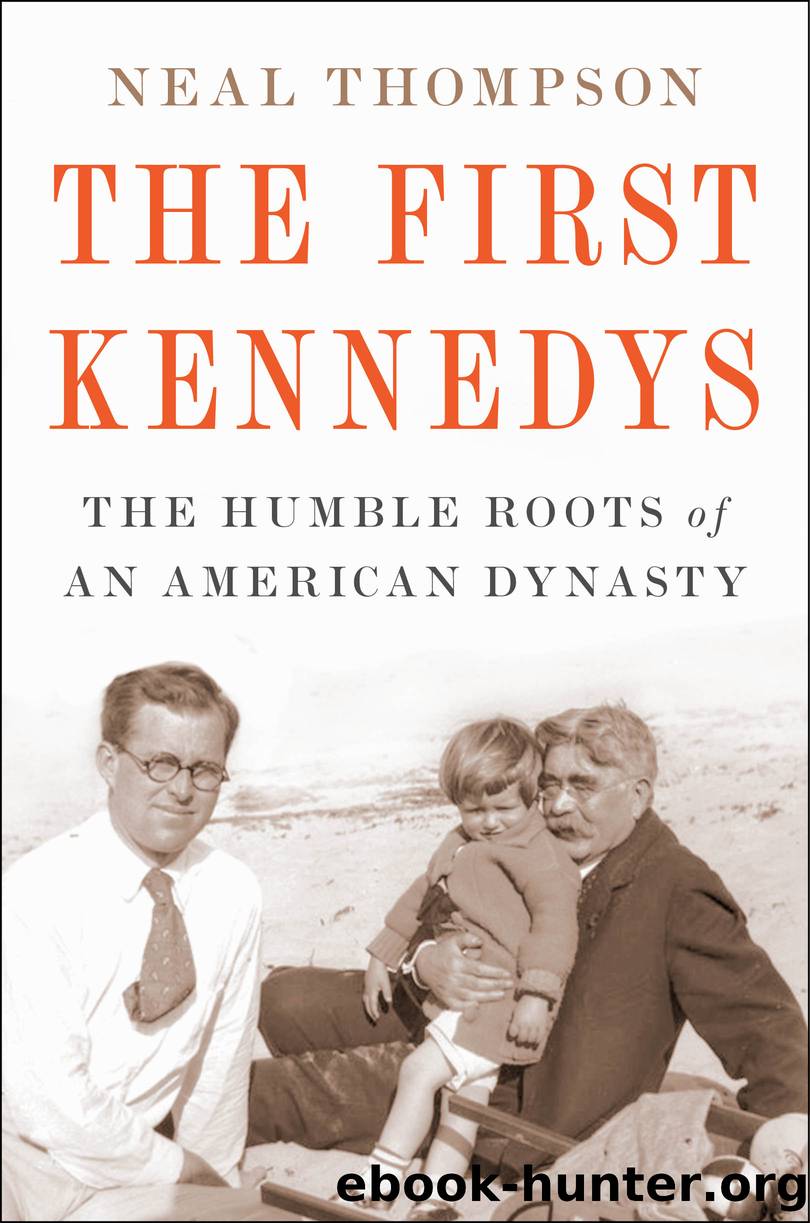The First Kennedys by Neal Thompson

Author:Neal Thompson
Language: eng
Format: epub
Publisher: HarperCollins
Published: 2022-01-12T00:00:00+00:00
16
P.J. the Democrat
EAST BOSTONâS WARD bosses kept hearing the name P.J. Kennedy, seeing it in newsprint for reasons other than the required public listing for a liquor license application.
There were the boat races in which P.J. led East Bostonâs rowing crews to victory against other wards. There was the work he and his roommate, Nick Flynn, had been doing for the Excelsior Associates social club, assisting with concerts and literary talks and grand balls at Maverick Hall. At one such affair, P.J. served as assistant director and watched proudly as a hundred couples danced at âone of the most agreeable affairs of the season,â as the Boston Globe described it. There were his efforts as a âguardâ for the Hancock and English Club, which was trying to drum up voter support for the Democratic presidential candidate, Winfield Scott Hancock, who in 1880 would lose by a hair to James Garfield.
Some ward leaders got to know P.J. at his beer hall, where heâd still occasionally tend bar, talking politics as he poured them lagers. Or they saw him marching with other Democrats in the St. Patrickâs Day parades or working the docks and the streets at election time, reminding people to voteâand for whom. Some had probably gotten to know P.J. at his motherâs shop, where she surely talked up her hardworking son.
One Democratic leader in particular took a shine to P.J. Daniel F. Kelly was the low-key but powerful chairman of the Democratic Ward and City Committee for Ward 2âone of the cityâs twenty-five electoral wards and, with the adjacent (but more Republican) Ward 1, comprised Bostonâs so-called island wards. Kelly suggested to his fellow Democrats that they start giving young Kennedy more responsibilities, a chance to prove his worth to the party.
Other Ward 2 operators also took P.J. under their wing: William A. Foss, a blacksmith turned Common Council member who now ran the East Boston ferries; Cornelius Doherty, a coppersmith turned liquor dealer turned Common Council member, who ran Bostonâs water department; and William J. Burke, a boilermaker turned Common Council member and state representative, now the cityâs elevator and building inspector. Each represented the ascent of an immigrantâfrom tradesman to political operative to holder of elected officeâa trajectory that P.J. admired. These men opened their doors, welcomed P.J. in. They invited him to speak before local dignitaries at Lyceum Hall, where he stood nervously at the podium and âread some resolutionsâ before the eveningâs activities, according to the Boston Transcript. He was not the most inspiring of public speakers, he and his mentors would learn. His skills shined brighter behind the scenes, as a community organizer and people manager. He put together a fundraiser for the Irish National Land League, also at Lyceum Hall, where 150 couples dined and danced past midnight. The next dayâs Boston Globe praised P.J.âs âefficientâ efforts.
These and other civic and political activities had a few things in common: they occurred within a block of P.J.âs saloon, they aimed to rebuild East Bostonâs
Download
This site does not store any files on its server. We only index and link to content provided by other sites. Please contact the content providers to delete copyright contents if any and email us, we'll remove relevant links or contents immediately.
| Military | Political |
| Presidents & Heads of State | Religious |
| Rich & Famous | Royalty |
| Social Activists |
Waking Up in Heaven: A True Story of Brokenness, Heaven, and Life Again by McVea Crystal & Tresniowski Alex(37808)
Empire of the Sikhs by Patwant Singh(23085)
We're Going to Need More Wine by Gabrielle Union(19046)
Hans Sturm: A Soldier's Odyssey on the Eastern Front by Gordon Williamson(18590)
Leonardo da Vinci by Walter Isaacson(13336)
The Radium Girls by Kate Moore(12028)
Tools of Titans by Timothy Ferriss(8394)
Educated by Tara Westover(8054)
How to Be a Bawse: A Guide to Conquering Life by Lilly Singh(7486)
Permanent Record by Edward Snowden(5847)
The Last Black Unicorn by Tiffany Haddish(5635)
The Rise and Fall of Senator Joe McCarthy by James Cross Giblin(5280)
Promise Me, Dad by Joe Biden(5153)
The Wind in My Hair by Masih Alinejad(5095)
A Higher Loyalty: Truth, Lies, and Leadership by James Comey(4963)
The Crown by Robert Lacey(4815)
The Iron Duke by The Iron Duke(4354)
Joan of Arc by Mary Gordon(4110)
Stalin by Stephen Kotkin(3965)
